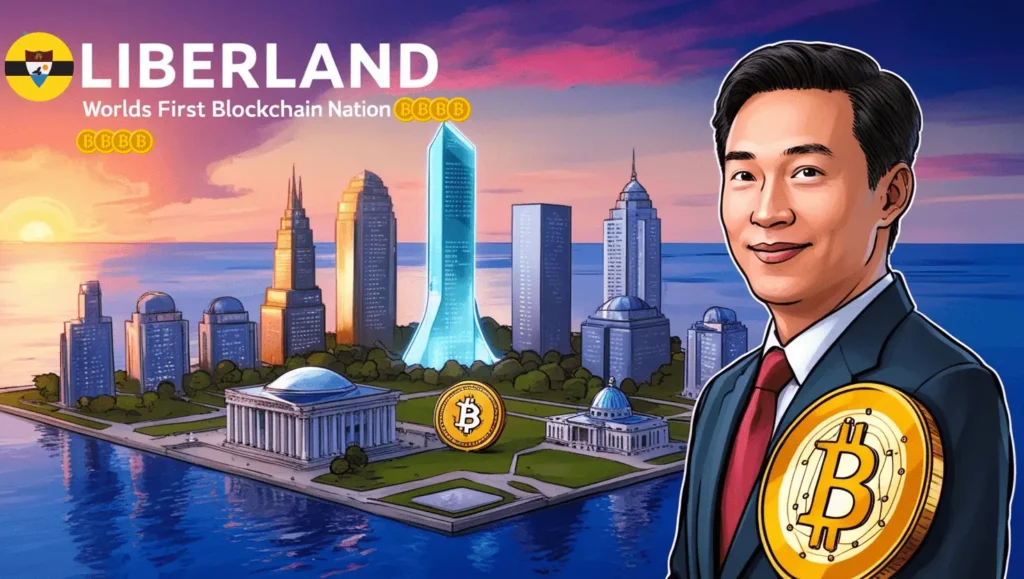
Liberland, a small self-proclaimed micronation nestled between Croatia and Serbia, represents a bold experiment in governance that blends libertarian ideals and blockchain technology. With the recent election of Justin Sun, founder of the TRON blockchain, as its president, Liberland’s trajectory has captured attention both in the cryptocurrency space and beyond. This article delves into the origins of Liberland, its governance, and what Sun’s presidency could mean for the future of this micronation.
Origins and Founding of Liberland
Liberland was founded on April 13, 2015, by Czech libertarian politician Vít Jedlička. The area, approximately 2.7 square miles (7 square kilometers), is located on disputed land along the western bank of the Danube River, an area which neither Croatia nor Serbia claims. Jedlička declared the area a free and independent nation based on libertarian principles, aiming to create a society with minimal government intervention, low taxes, and a high degree of personal freedom.
Jedlička’s vision was inspired by libertarianism and the desire to challenge traditional state structures. Liberland’s constitution emphasizes individual liberty, freedom of expression, the right to private property, and the establishment of a decentralized governance system. Although it is yet to gain official recognition from established nations, Liberland has garnered attention from libertarians, crypto enthusiasts, and advocates of self-governance worldwide.
Governance and Blockchain Integration
Liberland’s approach to governance is where it stands out. Its political system is designed to be as decentralized and transparent as possible, relying heavily on blockchain technology for various aspects of government operations, including voting and decision-making. The goal is to create a government that reduces the need for intermediaries and allows citizens to have direct influence over policies.
The election of Justin Sun as president of Liberland on October 5, 2024, marked a significant milestone in this experiment. Sun, known for his leadership in the cryptocurrency industry and his work with TRON and HTX (formerly Huobi), has been a staunch advocate of decentralized governance. His appointment is expected to bring even more attention to Liberland’s use of blockchain in governance and its potential to set a precedent for other nations interested in decentralized, transparent systems.
Justin Sun’s Path to Presidency
Justin Sun’s journey from cryptocurrency to politics may seem surprising to some, but his libertarian values and focus on decentralization align perfectly with Liberland’s founding principles. Sun has long advocated for decentralized systems in his work with TRON, promoting the idea that blockchain technology can revolutionize governance by giving power back to the people and reducing reliance on centralized authorities.
Sun’s election as president was conducted using a blockchain-based voting system, ensuring transparency and accuracy. This method of electing officials further cements Liberland’s commitment to using cutting-edge technology to model new forms of governance. Under his leadership, Liberland is likely to expand its focus on decentralized governance, potentially becoming the world’s first fully blockchain-powered country.
Language, Culture, and Population
As a young micronation, Liberland’s population is fluid and largely consists of expatriates and digital nomads from various countries. English serves as the primary language of communication, though other languages such as Czech and Croatian are also spoken due to its location in Central Europe. The nation’s open invitation to individuals from around the world aligns with its principles of freedom and openness, and many of its citizens are involved in the tech and crypto sectors.
While the population of Liberland fluctuates, the micronation claims to have over 700,000 people who have applied for citizenship, though the actual number of active citizens is significantly smaller. Liberland also issues e-residency, allowing global citizens to contribute to its economy and governance without physically residing within its borders.
Economy and Currency
Liberland’s economy is built around libertarian ideals of minimal government interference and low taxation. The country aims to create a free market where entrepreneurs can flourish with minimal bureaucratic hurdles. Given its strong ties to the crypto community, it is no surprise that blockchain technology and cryptocurrencies play a central role in its economy. Liberland accepts Bitcoin, Ethereum, and other cryptocurrencies as legal tender.
There has been speculation that under Sun’s leadership, TRON (TRX) or other blockchain assets could be integrated further into Liberland’s economic framework. This integration would not only bolster its economic system but also reinforce the notion of Liberland as a pioneering nation in terms of decentralized, digital governance.
Challenges and Opportunities
Despite its libertarian utopian aspirations, Liberland faces significant challenges. The biggest hurdle is gaining international recognition, as established countries like Croatia and Serbia have not acknowledged its sovereignty. Additionally, building infrastructure and maintaining a stable population will be crucial for its long-term viability.
However, Justin Sun’s presidency brings new opportunities. His global influence and expertise in blockchain technology could help put Liberland on the map—both figuratively and literally. Sun’s vision of decentralization aligns perfectly with Liberland’s goals, and if successful, it could serve as a model for how future nations might be structured in a decentralized, transparent manner.
Conclusion
Liberland, with its blend of libertarianism, blockchain-based governance, and global aspirations, represents a fascinating case study in the possibilities of new forms of governance. Under the leadership of Justin Sun, a well-known figure in the cryptocurrency world, this micronation has the potential to serve as a laboratory for decentralized governance and blockchain technology.
While Liberland faces numerous challenges, from gaining international recognition to building infrastructure, its commitment to pushing the boundaries of what is possible in governance remains undeterred. Sun’s presidency could very well mark the beginning of a new chapter in Liberland’s story—one where blockchain and decentralization take center stage in the governance of nations.
In the years to come, Liberland’s success or failure could have far-reaching implications for the global political landscape, particularly for those who believe in the power of blockchain technology to transform society. Whether or not Liberland achieves its ambitious goals, it will undoubtedly continue to inspire debate and innovation in the realms of governance, economics, and technology.
Must Read – How Blockchain Technology Will Revolutionize AI with Ethical Data Control

